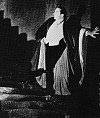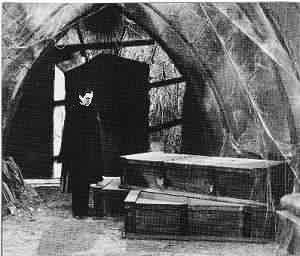
This is a new score for the classic Bela Lugosi Dracula film made by Universal
back in 1931. I am reviewing the score on its purely musical terms in this
review. A separate review of the video looks at the aptness of Glass's music
for the film.
Following on from Herrmann's Psycho score, Glass has chosen to use a
monochromatic score utilising just strings, and the close, limited configuration
of a quartet for this Gothic black and white film. Glass's minimalistic style
is prevalent but he uses multi-part writing, many string playing techniques,
considerably varied colours, dynamics and shadings, abrupt gear changes or
smoother modulations to sustain the interest. And yet, after about 40 minutes,
I have to admit I felt tedium setting in because of the relentless repetiton
of like material. This album would have been more effective for some ruthless
editing coupled with a judicious choice of material.
 The album opens with the main Dracula theme: dark swirling, demented
and tormented figures supporting screeching and piercing high-pitched staccato
chords. The evocative and atmospheric cues work well: cantering, galloping
figures for the 'Journey to the Inn', the swiftly shifting textures suggesting
violent gales for 'The Storm' and the swirling dense motifs for 'London Fog'
with its hints of hidden menaces. A dark, dank and creaky immensity is suggested
by the music for 'The Castle' and the disturbing high-pitched glissandi denote
only too well the 'Horrible Tragedy.' I thought the evocation of 'The Three
Consorts of Dracula' was rather bland and could have been more alluring after
all they are supposed to seduce their male victims but the 'Women in White'
suggests some sympathy for these condemned creatures. 'Excellent, Mr Renfield'
impressed in as much as it suggested a conversation piece with Renfield prattling
on about the legalities of the sale he has come to Dracula's castle to negotiate
while Dracula looks on with more bloody thoughts on his mind. 'Lucy's Bitten'
brings out the more colourfully melodramatic with Glass pointing up all the
fear and anguish and almost panic of the discovery of the affects Dracula's
dining session. An interesting experiment.
The album opens with the main Dracula theme: dark swirling, demented
and tormented figures supporting screeching and piercing high-pitched staccato
chords. The evocative and atmospheric cues work well: cantering, galloping
figures for the 'Journey to the Inn', the swiftly shifting textures suggesting
violent gales for 'The Storm' and the swirling dense motifs for 'London Fog'
with its hints of hidden menaces. A dark, dank and creaky immensity is suggested
by the music for 'The Castle' and the disturbing high-pitched glissandi denote
only too well the 'Horrible Tragedy.' I thought the evocation of 'The Three
Consorts of Dracula' was rather bland and could have been more alluring after
all they are supposed to seduce their male victims but the 'Women in White'
suggests some sympathy for these condemned creatures. 'Excellent, Mr Renfield'
impressed in as much as it suggested a conversation piece with Renfield prattling
on about the legalities of the sale he has come to Dracula's castle to negotiate
while Dracula looks on with more bloody thoughts on his mind. 'Lucy's Bitten'
brings out the more colourfully melodramatic with Glass pointing up all the
fear and anguish and almost panic of the discovery of the affects Dracula's
dining session. An interesting experiment.

Reviewer
Ian Lace


